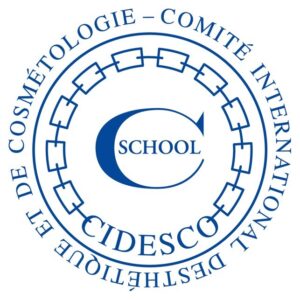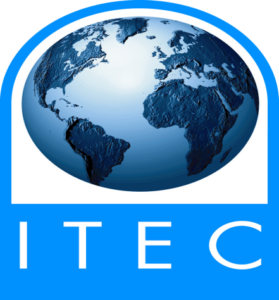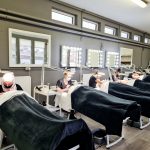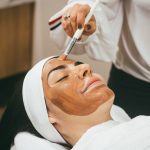Awards
This course is accredited by two separate examining bodies; ITEC and Cidesco.
We are delighted to be delivering qualifications accredited by CIDESCO. CIDESCO offers a range of beauty and spa qualifications which are highly valued by employers worldwide.

Diplomas from ITEC:
- Body Treatments ITEC Level 3 iBT3D12 (QQI Level 5 equivalent)
- Diploma in Facial Electrics ITEC Level 3 iBT3D15 (QQI Level 5 equivalent)
- Diploma in IPL ITEC Level 4 iBT4D3 (Diploma in Laser and Light Treatments ITEC Level 4 IBT4D3 QQI Level 6 equivalent
ITEC apply a rigid set of standards governing attendance, learning, and examinations. Graduates who achieve ITEC qualifications can become overseas members of ITEC. Examinations take place in April and May. Case studies are required for ITEC modules.

ITEC Diplomas
- Diploma in Body Treatments
- Diploma in Facial Electrical Treatments
- Diploma in Laser and Pulse Light Therapy
- Work Experience 6N1946
- Communications 6N1950
Extra-Curricular Activities
- Dermalogica Body and Facial Training
- Mud Make-Up Designery Training
- Presentation from Steiner Cruise Line and In-Flight Recruitment
- Field trip to the Irish Beauty Show at the RDS
- Aromatherapy Training
- Visits to Beauty Salons
- Visits to Health Farms/Leisure Centres
- Visits to Cruise Liners/In-Flight Therapists
Course Duration
This is a full-time one-year course which runs from September to May.
Entry Requirements
- ITEC Level 3 or equivalent
- Entry is subject to interview
Student Testimonial
Sarah
I qualified as a Beauty Therapist eight years ago in a private college after doing a part time beauty course. I left the industry for some time but was keen to go back and refresh my skills and knowledge. When Beauty Therapy became available in Mayo College, I was delighted as I did not need to travel far. I started all over again in Level 5 and I haven’t looked back since. This course has taught me so much that I had never learned before! The products and equipment in the College are of the highest standard and there is a lovely working atmosphere here. My knowledge and confidence have doubled. I love it!’
Fees
There are no fees to study this course.
Detailed Course Outline
ITEC Diploma in Body Treatments
Body massage, Figure diagnosis and Body electrics are all components which combined result in the complete body therapy qualification. Figure diagnosis is the study and analysis of different body types. We study all of the body types along with problems that may arise within tissues and muscles. Body electrics are used as part of the programmes we design for clients to help correct problematic areas in the body. Specific techniques are used to treat cellulite and sluggish circulation as well as specific problem areas. Using these therapies along with body massage, we can improve skin texture, muscle tone and figure faults.
ITEC DIPLOMA IN FACIAL ELECTRICS
Electrical equipment used in Facial therapy is becoming more technical and sophisticated and is designed to improve all skin conditions. The premise is that you can replace each part of the facial with an advanced piece of electrical equipment which will provide more effective results. The use of electrical equipment in skincare is becoming more widely used and there is now an expectation that one or more electrical machines will be used during facial treatments. During this Diploma, you will be using a vast variety of machines learning the technology behind the treatments and how to use them in a safe and professional manner.
ITEC DIPLOMA IN LASER AND INTENSE PULSED LIGHT TREATMENTS
Laser and Intense pulsed light treatments are becoming increasingly popular for hair removal and skin rejuvenation effects. You will learn about all the various types of laser and IPL machines on the market. Laser is extremely versatile due to its ability to produce beams of light in different concentrations of frequency and intensities. The use of this type of light is extremely effective in the treatment of unwanted superfluous hair. It is also very effective in the treatment of Acne vulgarus, Acne rosacea, skin pigmentation and all characteristics of aged and aging skin. You will learn to use these machines in a safe and proficient manner.
CIDESCO DIPLOMA IN BEAUTY THERAPY
On completion of the course, students take the CIDESCO Examination which consists of:
- Facial examination
- Body examination
- Project with Case Histories
- Written examination
Project with Case Histories
Candidates are required to research and write a Project assignment (2500-4000 words) on a subject relevant to the study of beauty therapy and connected to their Case Histories.
Diploma
The prestigious CIDESCO Diploma is awarded to candidates who have passed the CIDESCO examinations and given proof of having gained at least 600 hours work experience in a beauty center/salon.
CIDESCO Beauty Therapy Examinations
Facial Examinations
- Cleansing
- Skin analysis
- Eyelash and eyebrow tinting – Eyebrow shaping
- Deep cleansing
- Electrical equipment
- Facial massage
- Mask treatment
- Make-up
- Manicure/Pedicure
Body Examination
Body analysis
Electrical equipment
Body massage
Waxing
Project with Case Theories
The Project has its value in the practical examination and the pass mark is 70%.
Written Examination
This exam consists of multiple choice questions (MCQ) from all parts of the CIDESCO Theoretical Training Programme, for example:
- Natural Science
- Anatomy and Physiology
- Skin/Dermatology
- Cosmetic Science
- Aesthetic Treatments
- Business Studies
During the Practical Examinations Great Emphasis Is Placed On:
Professional expertise
Hygiene
Client care and interaction
Personal presentation
Work Experience (QQI 6N1946)
During this module students will plan and prepare for successful participation in a relevant work placement (a minimum of 60 hours). Students assess their present skill levels and are encouraged to research and plan for future education and employment opportunities. Students will also develop their understanding of the world of work, including the rights and responsibilities of both employer and employee. The work placement and subsequent feedback from supervisors assists students to make better informed decisions about future career choices.
Assessment technique: Collection of work: 60%; Skills demonstration: 40%
Communications (QQI 6N1950)
This module aims to allow students to develop their skills relevant to vocational, personal and interpersonal communications. Students gain an understanding of the use of modern information and communication technology (ICT), in personal and vocational life. This course will assist students to gain greater confidence in their written and oral communication skills needed for both the workplace.
Assessment Technique: Collection of Work – 50%, Skills Demonstration – 50%


